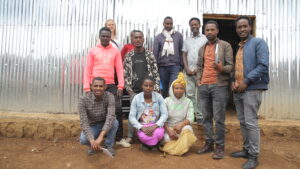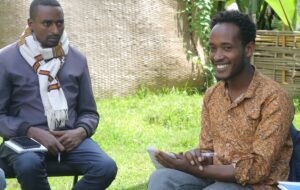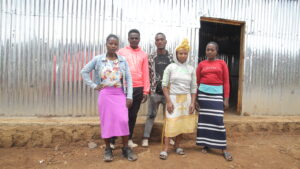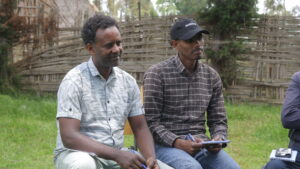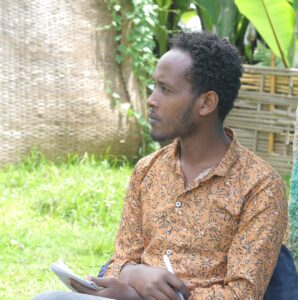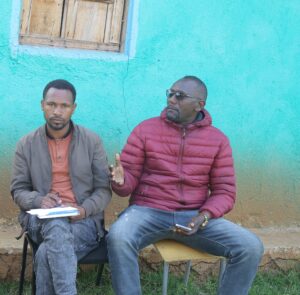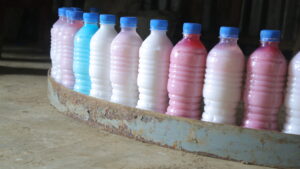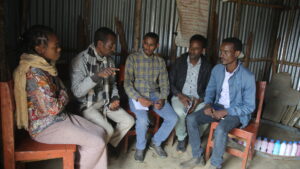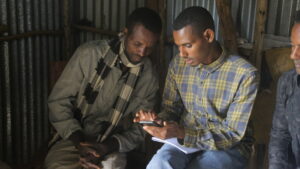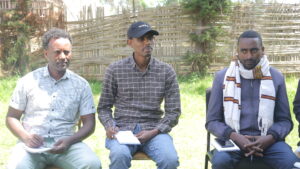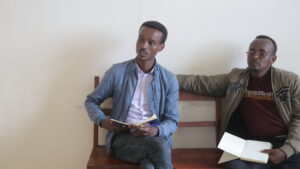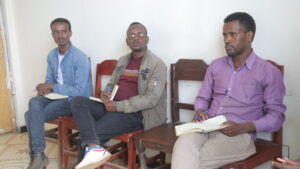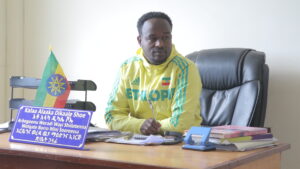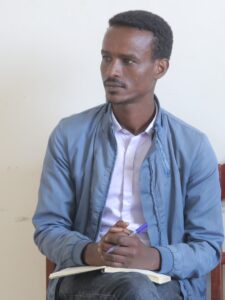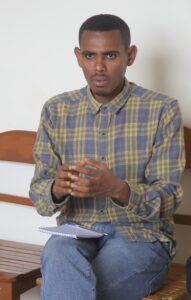The COWASH IV Federal Technical Assistance Team (FTAT) last week provided on-the-job training to two small-scale microfinance enterprises engaged in providing sanitation and hygiene products through market-based sanitation centers in Arbegona and Chirone Woredas of the Sidama region. The market-based sanitation centers were established by COWASH in collaboration with the project Woreda offices of Health, Water and Job, Skill and Small Micro Finance Enterprise Development.
The training was designed to help members of the Arbegona’s Hiito Small Micro Finance enterprise as well as Chirone Woreda’s Rori Small Micro Finance enterprise improve their capacity in producing and providing sanitation and hygiene products. It is also crucial to ensure that the training of trainers’ sessions provided earlier by the FTAT has been cascading appropriately and to monitor the implementation of the project, said Mulatie Yinger, COWASH IV Small and Medium Enterprises and Micro-Finance Institution Specialist.
The FTAT also had discussions with concerned project woreda communities, woreda experts, and small-scale enterprises engaged in market-based sanitation centers to identify challenges faced by the enterprises and forward solutions. Following the discussions with concerned sector offices in both woredas, an action plan has been drafted listing the expected work to be carried out by each office.
COWASH IV is committed to Providing Integrated WASH Services in Rural Ethiopia
COWASH IV is a project committed to providing integrated water, sanitation, and hygiene (WASH) services in rural Ethiopia. One of the project’s key initiatives is to establish market-based sanitation centers, private sector entities that supply sanitation and hygiene products to the community.
The goal of the market-based sanitation center initiative is to ensure that at least 80% of water supply beneficiaries own improved household latrines. To achieve this, COWASH IV works with concerned woreda offices to organize and support small-scale microfinance enterprises, private sector entities that supply sanitation and hygiene products to the community. These enterprises are provided with training on how to produce and sell sanitation products as well as production and sales facilities for the market-based sanitation centers. COWASH IV provides start-up capital in kind to the enterprises.
The market-based sanitation center approach has been key to achieving COWASH IV’s aim of creating a sustainable and climate-resilient WASH service. It has also been critical in creating jobs for the youth and ensuring accessibility of sanitation and hygiene products to project woreda communities.
COWASH IV: Empowering Communities and Improving Sanitation in Rural Ethiopia
The market-based sanitation center initiative empowers communities by giving them ownership of their sanitation and hygiene. The enterprises are run by local people, and they provide products and services that are tailored to the needs of the community. In addition to gaining a stable income for themselves and their families, the centers allow them to serve their community, as explained by Teku Abraham, representative of Rori small and medium enterprises.
The market-based sanitation centers also make sanitation products more accessible and affordable for community members, said Matiwos Kismo, COWASH IV Sidama regional support unit sanitation and behavioral change specialist. In the past, according to him, people had to travel long distances to purchase sanitation products, which was both time-consuming and expensive.
This is helping to improve sanitation in rural Ethiopia by increasing access to affordable sanitation products and by promoting sanitation and hygiene practices. The enterprises provide a variety of sanitation products giving people a wide range of options to choose from, depending on their needs and budget.
The market-based sanitation centers also work closely with the health office to promote sanitation and hygiene practices in the community. This includes educating people about the importance of using sanitation facilities and washing their hands regularly.
Overall, The COWASH IV market-based sanitation center initiative is a successful example of how to empower communities and improve sanitation in rural Ethiopia. The initiative is providing jobs for the youth, making sanitation products more accessible and affordable, and improving overall health and well-being.
COWASH IV Makes Significant Progress in Providing Integrated WASH Services in Rural Sidama Region
The COWASH IV project is making significant progress in providing integrated water, sanitation, and hygiene (WASH) services in rural Sidama. In 2015 Ethiopian fiscal year alone, 58 new and 19 rehabilitated community water schemes were constructed under the project, supplying safe water to 34,443 rural people. Of these, 22 new and 12 rehabilitated water schemes were constructed in Arbegona and Chirone Woredas. In addition, COWASH IV facilitated the construction of 1,188 improved household latrines, one school center latrine and two health center latrines.
The project’s integrated approach to WASH is essential for improving the health and well-being of rural communities. By providing access to safe water, sanitation, and hygiene facilities, COWASH IV is helping to ensure sustainable and climate resilient WASH service and improve the quality of life for rural Ethiopians.
